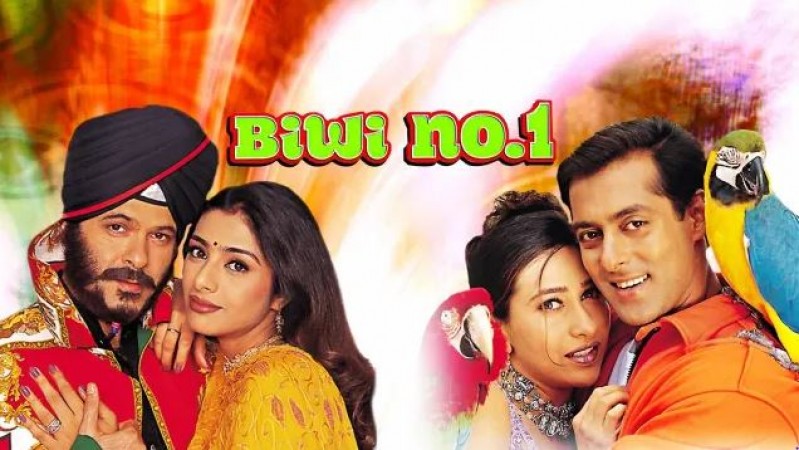
The Indian film industry, or Bollywood, is renowned for its variety of genres and narrative styles. It has seen everything, from tear-jerking thrillers to sweeping love stories. Bollywood's filmography now includes remakes, adaptations, and works that draw inspiration from other international films. The 1999 Bollywood film "Biwi No. 1," which was directed by David Dhawan and starred Salman Khan, Karisma Kapoor, and Sushmita Sen, is one such example. The 1989 American film "She-Devil," which was helmed by Susan Seidelman and starred Meryl Streep and Roseanne Barr, is frequently compared to the movie. This article will examine the parallels, discrepancies, and changes that took place when "She-Devil" was remade as "Biwi No. 1."
The plot of the dark comedy "She-Devil" centres on Ruth Patchett (Roseanne Barr), a depressed housewife who becomes a vengeful mastermind after her husband Bob (Ed Begley Jr.) deserts her in favour of a glamorous romance novelist named Mary Fisher (Meryl Streep). Using her cunning skills to manipulate and sabotage Mary Fisher, Ruth sets out on a mission to ruin her ex-husband's life and career.
The Bollywood setting of "Biwi No. 1," however, applies this theory. Prem, a wealthy businessman who is happily married to Pooja (played by Karisma Kapoor in the movie), is the main character. Prem is played by Salman Khan. However, things change when he develops feelings for seductive supermodel Rupali (played by Sushmita Sen). To free her husband from Rupali's control, Pooja, a devoted housewife, goes through a transformation. Similar to "She-Devil," "Biwi No. 1" examines the concepts of retaliation, transformation, and empowerment.
Ruth Patchett vs. Pooja: Ruth is portrayed as an untidy, overweight housewife in "She-Devil," who is at first taken for granted by those around her. But as she plans her retaliation, she experiences a profound physical and mental transformation. In "Biwi No. 1," Pooja is initially portrayed as a conventional, traditional housewife who later becomes a self-assured, contemporary woman in an effort to win back her husband. In their respective films, both characters undergo significant character development.
In "She-Devil," Mary Fisher portrays a glitzy and successful romance novelist, whereas Rupali portrays a supermodel in "Biwi No. 1." Both of the characters stand in for the 'other woman' that draws men away from their wives. Rupali is portrayed as a more sympathetic character who eventually understands the value of true love and family, in contrast to Mary Fisher's character who is portrayed as being incredibly materialistic and shallow.
Bob vs. Prem: In "She-Devil," Bob, Ruth's husband, is portrayed as a spineless individual who is easily swayed by the women in his life. Prem, on the other hand, is a wealthy businessman in "Biwi No. 1" who is genuinely torn between his wife and his mistress. Compared to Bob, his character is given more nuance and complexity.
The cultural adaptation is one of the biggest differences between "She-Devil" and "Biwi No. 1." Bollywood elements like song and dance routines, melodrama, and humour are incorporated into "Biwi No. 1"'s story. Bollywood-style songs and dance sequences are featured in the movie, giving the narrative a distinct Indian flavour.
A noteworthy cultural adaptation is Karisma Kapoor's transformation of Pooja. She alters not only her appearance but also her outlook on modernity while upholding her traditional principles. The idea of a woman's empowerment and self-discovery is reflected in this character arc, which appeals to the Indian audience.
The social commentary in "She-Devil" and "Biwi No. 1" is on how women are viewed in society. The fact that Mary Fisher's success is largely based on her appearance in "She-Devil" serves as a critique of the shallowness of materialism and the objectification of women. The social pressures on women to preserve their marriages and uphold family values, despite being betrayed, are discussed in "Biwi No. 1" in contrast.
It's clear that "Biwi No. 1" was influenced by "She-Devil," but it adapts "She-Devil's" basic idea into a Bollywood extravaganza that appeals to the tastes and sensibilities of the Indian audience. A message about women's empowerment is conveyed in the movie while also successfully fusing elements of comedy, drama, and romance. It explores the concepts of transformation and self-discovery through the perspectives of Pooja and Rupali, ultimately highlighting the value of inner fortitude and self-assurance.
Movie adaptations and remakes are commonplace in the world of cinema, and "Biwi No. 1" is a prime example of how a story can be reimagined in a different cultural setting while maintaining its central themes. Even though "She-Devil" and "Biwi No. 1" differ in some ways, both films add to the rich tapestry of storytelling in their respective film industries.
Celebrating the Birthday of Mrinalini Sharma: A Bollywood Star's Journey
When 'Mohabbat Isko Kehte Hain' Became 'Yes Boss'
Tracing SRK's Iconic Journey from 'Yes Boss' to the Majesty of Mannat